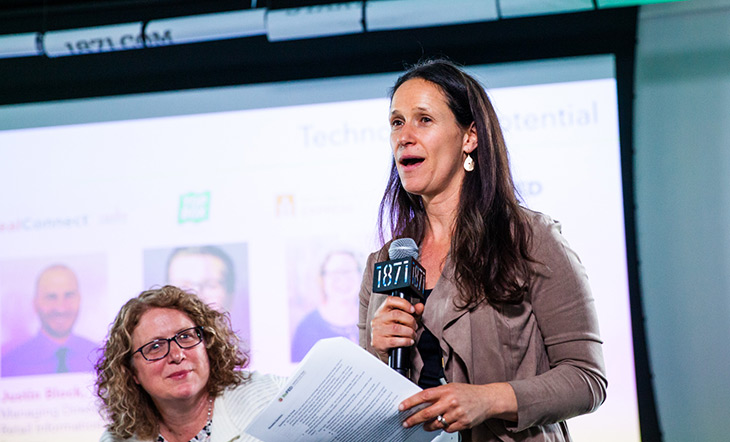
The COVID-19 pandemic has already permanently shuttered 17 percent of restaurants nationwide, forced millions into unemployment, and left chefs, owners, and workers struggling to imagine what the future looks like in the near- and long-term. As states move from re-opening to returning to restrictions on dining and the industry continues to try to adapt, we're sharing stories from the front lines of businesses reacting to this new landscape. Below, Dana Gunders, executive director of ReFED, shares how the challenges of the pandemic have led to a reduction in food waste, as restaurants retool their menus for safe dining, and how those practices could have lasting impacts if made permanent.
--
The restaurant industry is in crisis. At the end of 2020, 17 percent of restaurants nationwide had shuttered, and millions of chefs were forced to pivot—and then pivot again. Preorders. Takeout. Smaller menus. Simpler dishes.
It’s been exhausting, stressful, and scary, to say the least. But there may be a silver lining amid the wreckage. All this gut-wrenching change could lead to significantly less food waste in restaurants, bolstering the fight against climate change and buoying restaurants’ bottom lines when it’s needed the most.
Let’s take a quick look at the sector. According to ReFED, where I am executive director, restaurants and foodservice accounted for nearly 16 percent of food uneaten in the U.S. in 2019, or 12.7 million tons. About 75 percent of the food tossed went straight to a landfill, where it decomposed and released methane, a potent greenhouse gas.
This is despite the proven economic benefits of tracking and curtailing waste: a 2019 report from 12.3 Champions, a coalition dedicated to achieving national and international goals to cut food waste in half by 2030, revealed that for every $1 restaurants invested in food-waste tracking, they saved $7 in operating costs. What's more, those benefits accrued quickly: within one year of implementing a food waste-reduction program, 76 percent of businesses reported recouping their investment, and within two years, that number grew to 89 percent.
So why are rates of food waste so stubbornly high? There are several reasons. One is that many American restaurants have long prioritized choice, offering large menus to please any palate. These endless options require generous walk-ins and freezers full of varied ingredients that spoil if not used in a timely manner. The even bigger culprit was plate waste. ReFED’s analysis found that some 70 percent of food that restaurants and foodservice businesses throw away (nearly 9 million tons) is a result of customers not eating all they have been served, a concerning indicator that portion sizes may be too large on the whole.
The COVID-19 pandemic has already begun to shift these norms—and as businesses start to reopen and ramp up their operations, now is the time to make these changes permanent. Take menu sizes: last spring, independent restaurants and chains alike slashed the size of their menus in an effort to minimize food inventories and the number of staff needed. And few are talking about going back to the old ways. Darden Restaurants, which owns brands including the Olive Garden and Capital Grille, cut its menus by as much as 40 percent last summer and, according to its CFO, saw results “significantly better” than anticipated because of the move.
Smaller restaurants also see the wisdom in smaller menus: “Gone are the days when I baked hundreds of pastries and hope people arrive,” Kristen Hall, the pastry chef and co-owner of Bandit Patisserie and the Essential, both in Birmingham, Alabama, told Washington Post critic Tom Sietsema. Instead, she explained, preorders reduce waste and create something for loyal customers to look forward to.
Portion sizes, at least in some places, are declining, too. Buffets, where “eyes-bigger-than-your-stomach syndrome” leads many customers to overserve themselves, will be slow to make a comeback for health reasons. But it will require resolve to cut portion sizes in full-service restaurants. Chefs are generous by nature, and they want to make their customers happy. (And what makes people happier than plates piled high with food and a doggie bag to take home?)
But the upside of smaller portions is substantial. According to ReFED’s analysis, smaller portions would save restaurants and their guests $9 billion annually and the unwasted food would avert 11.5 million tons of greenhouse-gas equivalents. That’s the comparable to taking nearly 2.5 million cars off the road. Smaller portion sizes can also offer the opportunity for consumers to sample more dishes, potentially increasing check averages.
As we pass the one-year anniversary of the pandemic, I realize how hard it is to ask chefs and restaurateurs to do anything more than survive. But as punishing as the last year has been, it has also served up an opportunity to reimagine and build both a stronger industry and more sustainable planet.
ReFED’s top recommendations to prevent food waste in restaurants and foodservice businesses:
- Offer reduced portion sizes and “à la carte” choices: discourage plate waste by reducing portion sizes and/or offering customers flexibility in portion sizes, sides, and à la carte options.
- Track waste: implement waste tracking processes to inform production, menu planning, and inventory management.
- Design low-waste menus: implement low-waste menu design solutions, including smaller menus, product repurposing, and whole-product utilization.
- Sell end-of-day product: employ dynamic pricing options for end-of-day sales, such as late happy hours or using markdown alert apps.
- Establish donation relationships: for unavoidable waste, establish relationships for collection of extra food for donation, either directly with organizations or through matching software solutions.
ReFED also worked with the James Beard Foundation and other partners on guidelines for incorporating food waste reduction into post-COVID operational plans. You can find them here.
Learn more about how sustainability fits into our efforts to keep restaurants open for good.
--
Dana Gunders is the executive director of ReFED, a national nonprofit working to end food loss and waste across the U.S. food system. Learn more about ReFED on Twitter.







